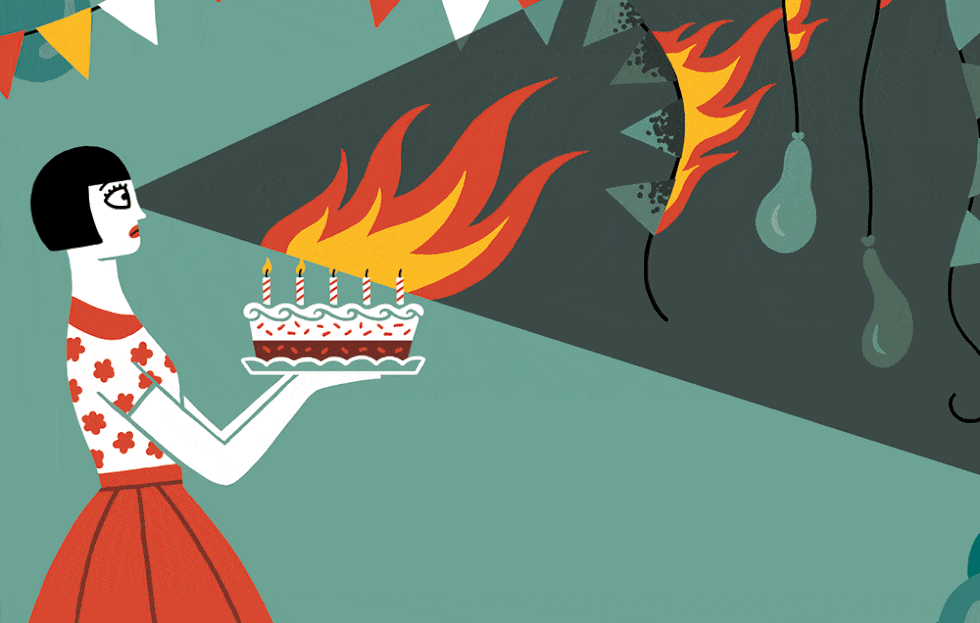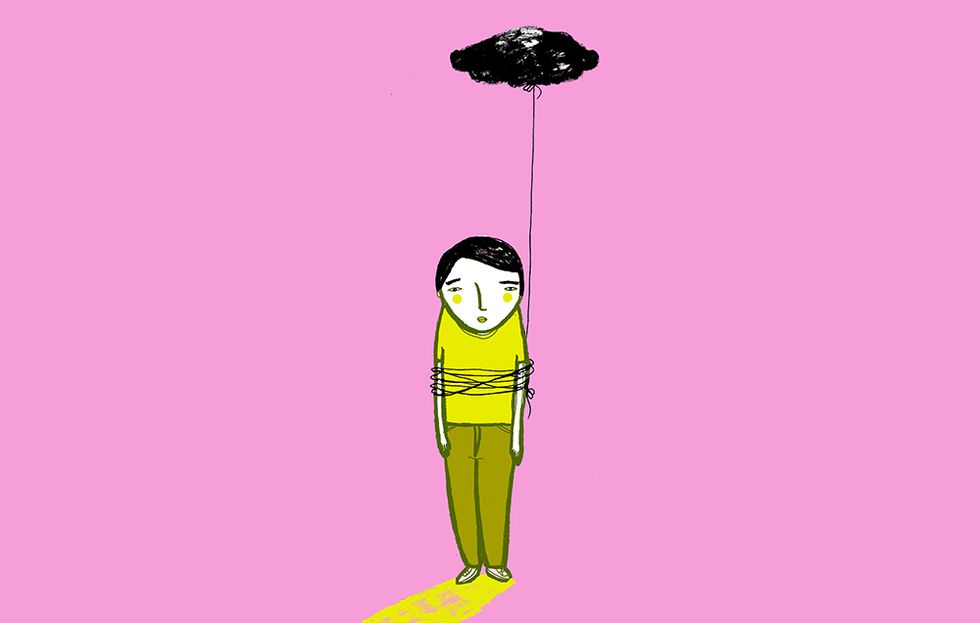How To Quit Your Negative Thinking For Good
Even if you're absolutely positive that you're destined to be a glass-half-empty kinda gal for life, you're about to have your last negative thought. That's because next time you take a flying leap into defeatist mode, your brain will be armed and ready. The latest mindfulness training helps you shut down your incorrigible lifelong friend Debbie Downer—for good. (Try these 17 positive habits that will change your life forever.) Here's how to overcome six all-too-common scenarios:
1. You anticipate disaster around every corner.

You want to throw a surprise party for your friend, but in between planning you can't help but think about all that might go wrong. What if someone spills the beans? What if you invite the wrong people? What if the streamers go up in flames?
What the pros call it: Catastrophizing
Telltale signs: Your brain loves dress rehearsals for tragedy. You dismiss more realistic possibilities and fixate on the worst possible outcomes.
Combat it now: Remind yourself that this negativity is just your brain trying to keep you safe by preparing for every potential problem ahead, recommends Barbara Fredrickson, director of the Positive Emotions and Psychophysiology Lab. Then say to yourself, Thanks for trying to protect me, brain. But you can rest now—I'll take it from here. This is one of the rare times when talking things through with a friend might not be the answer. "If you have an exaggerated negativity bias or anxiety, a friend might not be able to talk you out of it," Fredrickson notes. (Find out if your anxiety is a sign of something more significant.)
Banish it for good: A mantra of resilience can keep runaway thoughts in check. When you start worrying about horrible birthday parties and burning buildings, rebuff the thought with a line like, Whatever happens, I can cope. That statement of strength can help you go forth feeling determined rather than defeated.
2. You assume everything's your fault.

You really clicked with the new member of your book club. But then you hear from a friend that she's dropping out, without giving a reason. Your first thought: It was probably something I said. Was I not welcoming enough? Did she not actually like me?
What the pros call it: Personalizing
Telltale signs: You tend to think you're responsible for all the negativity around you, without considering other explanations. (Try these 10 super-easy ways to destress in under a minute.)
Combat it now: Cultivate some perspective to cut off this misguided thinking. The next time it occurs to you to personalize someone else's behavior, have a counterstatement ready, like This is just negative thinking. I am not responsible for everything. A weirder fix: Walk through a doorway. "Doing that gives you a new context," Fredrickson says. According to scientists at the University of Notre Dame, the act of passing over a threshold cues the brain that you're finished with the situation at hand and ready to move on to something new. (If you're feeling negative, here's how to embrace positivity in your life.)
Banish it for good: Accept that "99% of the time you have nothing to do with the mood someone's in," says Rebecca Gladding, psychiatrist and coauthor of You Are Not Your Brain. (Maybe your book club chum moved, or maybe she's dealing with a sick parent, or maybe a thousand other things.) If your conviction wavers, consider—duh!—checking in with the person to see what's up, or asking a friend for perspective, she says.
3. You think how you feel is how things are.

You sometimes relish an evening at home, but tonight, having no plans has left you feeling lonely. You curl up on the couch and think, No one cares about me. I'm all alone.
What the pros call it: Emotional Reasoning
Telltale signs: Your mind fuses together feelings and reality. When you feel lonely, you think nobody cares about you. When you feel guilty, you think you must have done something wrong.
Combat it now: Get some distance from your feelings so you can begin to recognize them as just that: feelings. In The Happiness Trap, psychologist Russ Harris recommends describing the emotion ("I am lonely") as a temporary state: "I'm feeling lonely." Next, try adding more space between you and the emotion by subtly restructuring the statement as "I'm noticing that I'm feeling lonely." Take it one step further with a little zaniness. Harris suggests singing your "I am" statement ("I am lonely") to the tune of "Happy Birthday." Then try singing in a cartoon character's voice. Even if you don't crack a smile, you'll be putting more space between your ridiculous self and that even sillier negative thought. (Friends can help you get out of that negative space. Here are 7 friends every woman should have.)
Banish it for good: Curb a tendency toward emotional reasoning through meditation. (These 8 simple meditations can change your life.) "The central skill that emerges from meditation is decentered awareness—the ability to perceive thoughts as impermanent," Fredrickson says. "So if you feel sad, that doesn't mean you are a failure. If an angry feeling arises, you can recognize it without overly identifying with it." If the thought of meditation makes you fidgety, try this instead: Spend 1 minute mentally scanning how your entire body feels. Focusing on physical sensations, like how the chair feels against your back, is a quick and subtle reminder that your thoughts and the world around you are distinct.
4. You fixate on the downside.

The risotto at your recent dinner party turned out great, the conversation flowed, even your standoffish cousin seemed at ease. But your dessert was a flop—an unset cheesecake that tasted more sour than sweet. Three days after the party, you're still thinking about it and cringing.
What the pros call it: Magnifying the Negative
Telltale signs: You have an eagle eye for vexing details, and you tend to blow them up until all the positive—and all the context—falls out of view. (Here's exactly how to train your brain to be more optimistic, according to science.)
Combat it now: Force yourself to list three good things instead. (Dessert fell flat, but remember how much they loved the risotto?) If the bad thought keeps returning, think, say, or even shout the word "Stop!" advises Sonja Lyubomirsky, a professor of psychology at the University of California, Riverside. Even picturing a giant red stop sign can help.
Banish it for good: When this type of thinking regularly comes up about something more permanent, like your body image or your marriage, try this: Write down your negative thought, crumple up the paper, and throw it away. In a study at Ohio State University, people who wrote down negative things about their bodies and then tossed the notes had a more positive self-image later compared with those who kept the papers with them. "They physically discarded the thoughts, but it was as if they'd mentally discarded them as well," says Richard Petty, the study's coauthor and a psychology professor at the university.
5. You see patterns of defeat.

For 3 weeks you've stuck to your goal of daily treadmill walks. But then you hit a stressful patch at work and skip them for four days straight. You think, I always quit exercising eventually. I'm such a slug.
What the pros call it: Overgeneralizing
Telltale signs: You take a bad moment and draw huge, sweeping conclusions from it.
Combat it now: Distract yourself. When you're doing something routine—prepping dinner, say—your brain goes into autopilot. That's when you're most likely to start cataloging all the ways you've blown it before. But if you distract yourself with an activity that demands full focus, like following a new recipe (try these farmers' market recipes from Prevention Premium), toxic thoughts will have less room to take over.
Banish it for good: "Imagine your oldest friend, or someone else you want the best for, is having the same self-defeating thought," Gladding says. "What would you say to her? How would you feel about her situation?" This sort of cognitive restructuring, which Gladding has dubbed the Wise Advocate, can amplify the compassion you feel for yourself, inoculating you from being so unnecessarily hard on yourself in the long run.
MORE: 7 Women Who Prove Age Means Nothing When It Comes To Following Your Dreams
6. You're sure stuff won't go well.

You see a job posting that makes your heart leap. Then you start calculating the odds of your resume actually being seen. You think, Why waste my time? I'll probably never get picked. (Is your job stoking your anxiety? Here are some tips to prevent job burnout.)
What the pros call it: Negative Forecasting
Telltale signs: You anticipate bad outcomes no matter the signs. (Here are 9 traits all optimists have in common.)
Combat it now: "A lot of our negativity comes from mental time travel," Fredrickson says. "Odds are the current moment is benign or even positive." Press your toes into the floor to bring your focus out of your mind and back to your physical surroundings, then take stock of one positive thing, however tiny.
Banish it for good: Resilience is your ticket. "Resilient people tend to have a wait-and-see attitude rather than creating negativity through their expectations," Fredrickson says. You can build resilience with a steady diet of positive emotional experiences. That can be as simple as signing up for that weekly meditation class you've been curious about or writing down something you're grateful for every evening. Try it tonight—the only thing you stand to lose is a little unnecessary pessimism.

Gisele Bündchen Discusses ‘Severe‘ Panic Attacks

Simple Ways to Stop the ‘Nocebo Effect’

The Very Best Foods to Help Ease Anxiety

Jennifer Grey Opens Up About ‘Bad’ Anxiety








